I have read a lot but reviewed almost nothing over the past few months. Here is my attempt to get caught up on all those outstanding reviews. First up, old review copies I finally got around to reading.
%%%%%%%%%%
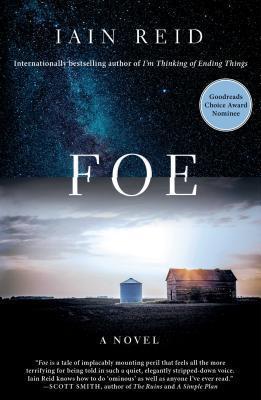
I adored Iain Reid’s first novel, and I am happy to report that I enjoyed his second novel every bit as much as his first. I was not confident I was going to do so though. Mr. Reid immediately places you into the setting without any world-building, so you must infer all details at the same time as you watch the story unfold. It is offputting to a reader who may not want to do this because there are few specifics to anchor you to a time and place, leaving you adrift wondering what is happening.
However, for readers willing to infer from the smallest of details, Foe is a deliciously creepy futuristic story in which you are as much in the dark as the main character. You don’t know who the villain of the novel is, but you know there is one because of the way the story makes you feel. The feeling of dread creeps up on you, clawing its way under your skin and never relinquishing its hold, but you never understand why you think this way. There is nothing about Junior and Hen which would indicate a reason for the dread, and there is nothing about Terrence which would show the same. Sure, it is a bit odd to find out that an unknown entity selected you for space travel without your knowledge or permission. Sure, the idea of having a replacement you take your spot in your life is weird. There is nothing overly ominous about any of it, but it is there nonetheless.
Mr. Reid excels at creating suspense where none should seemingly exist. He has you seeing monsters when there are none and using sleight of hand to distract you from the truth. Then, when you least expect it, he smacks you across the face with that truth that rocks you to the core. There is not much in the way of action, but he makes up for that with plenty of atmosphere, again something at which Mr. Reid shines. I highly recommend you check out this incredible author.
%%%%%%%%%%
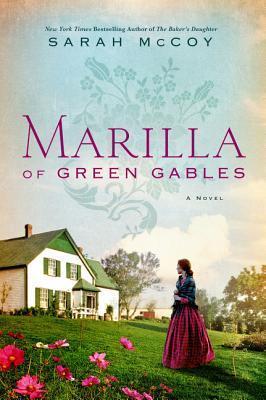
Like almost everyone I know my age, I grew up adoring the Anne of Green Gables series. Anne Shirley made me feel better about being an odd duckling, for loving to read and to learn when it seemed that everyone my age scoffed at it, for being socially awkward, and for being a dreamer. So when I found out that Sarah McCoy was writing a novel about Marilla Cuthbert, I knew it was something I had to read.
I might have delayed reading it for a while, but it was worth the wait. Marilla of Green Gables is a great story, but most importantly, Ms. McCoy captures the essence of the original series. Anne fans will recognize all aspects of the island, including familiar faces as well as places. She fills the void in Marilla’s past while staying true to her character, allowing for youthful dreams while recognizing that her loyalty to family is her most important, and best, attribute.
Marilla of Green Gables is perfect for Anne fans who are looking for something a little different but still in keeping with the story we all know and love. It is the type of feel-good story we all need right now, the kind that reminds us of what is truly important while telling us that every age has its struggles. Moreover, it fills a void you don’t even know exists and is a soothing balm against the ravages of the recent years. For that alone, it is well worth taking the time to read this charming novel.
%%%%%%%%%%
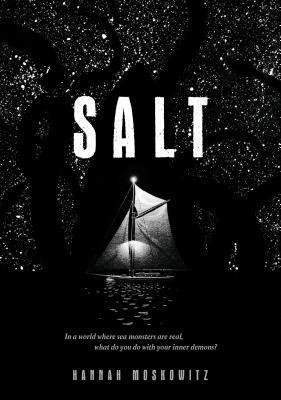
When I finally decided to read Salt by Hannah Moskowitz, it made me nervous. The reviews were mediocre, and I could not recall my reasons for requesting it to review. I opened the book determined to give it a chance. What I found between its pages was unexpected but entirely welcome.
Salt is a quirky story about a family of orphaned sea monster hunters. The two oldest children, ages, seventeen and sixteen, are trying to maintain a semblance of normalcy for their two younger siblings while finding themselves increasingly at odds about their future. Bela, the oldest, wants revenge by hunting down the sea monster who killed their parents. Indi, the family caretaker, dreams of a life on land, one that is as foreign to him as living on the sea is to most of the story’s readers. The story follows Indi as he makes choices that will affect his family forever.
There is something seductively charming about this rag-tag family of four. I use the word seductive not in a sexual connotation but in a way that intimates how much the family grabs your attention and refuses to let it go once they have it. They are completely down on their luck, with almost no money and no knowledge of how life on land work. They bicker and fight as all siblings do, but there are faith and camaraderie that exists between the four that I find rare and entrancing. They are a group that is entirely dependent upon one another during a battle, and that blind trust in each other is a marvel to behold.
At the same time, you never forget that these are still children, children without parents to guide them and help them navigate the difficulties of life. The youngest is only six years old. Bela and Indi try to fill their parents’ shoes but, as we see with Indi, are adrift themselves with the loss of their parents. Their plight, as well as their determination to stay the course, tugs at your heartstrings even while you know that each one of them would scorn your sympathy.
Salt may have strange sea monsters and pirates, ocean battles, and perilous journeys across the sea, but it is ultimately a story about family and those ties that bind one to another. It is about duty and choice and freedom. Admittedly, my expectations for Salt were low, but I felt a pull towards this odd novel that is difficult to explain and even more difficult to ignore. You read to determine whether they get a happy ending, something all four so richly deserved after losing their parents and the familiarity of their monster-hunting ways. You keep reading as a way to make sure the kids are okay because somewhere after the first page, the kids found a way into your heart.
Salt is not a novel for everyone; the numerous mediocre reviews attest to that fact. For those who are willing to give it a chance, they will find a somewhat silly novel that is surprisingly endearing and extremely memorable. After all, it isn’t every day you read about a family of orphans who fight sea monsters who eat cats or pirates who steal everything they can without harming anyone.
%%%%%%%%%%
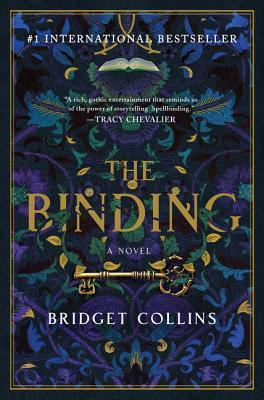
The Binding by Bridget Collins is another unusual novel with a premise that most book lovers would find horrifying and utterly unimaginable. After all, in Ms. Collins’ world, books are not for reading but instead are objects of fear and loathing. It is a difficult premise to acknowledge, let alone accept. Difficult, that is, until you learn why the people in Ms. Collins’ world fear books and anyone having to do with them. Then the true horror fills you.
The Binding appeals to fans of historical fiction with its lush prose and exquisite details of a long-ago time and place. Ms. Collins makes it easy to imagine every aspect of Emmett’s life, from the manual effort it takes to run a farm to the simple chore of heating a house topped with thatch. At its heart, however, it is a fantasy novel, one in which books are nothing more than memories taken from desperate people, sometimes against their will, an idea that repulses and attracts the reader as much as it does Emmett.
The Binding is also something extra in that it is a novel that encourages tolerance and acceptance of all walks of life. It uses the power of books to teach such lessons, even while the story of stolen memories appears to be to its sole purpose. I was not expecting this important sideline story, but once it started to take shape, it impressed me with its fervency and openness, and it continues to impress me with the tenderness and care with which Ms. Collins approached such a topic.
I devoured The Binding with its story of magic and mystery, cruelty and love, power and submission. I wasn’t sure what to expect with this unusual story where books are objects to avoid, but what I discovered was a memorable, well-written story that ended too soon. I want to get to know more of Emmett’s world, and I want to learn more about bookbinding and the magic behind it. I can only hope Ms. Collins intends to write a sequel to this fascinating book so that I can continue to explore her fascinating world.
%%%%%%%%%%
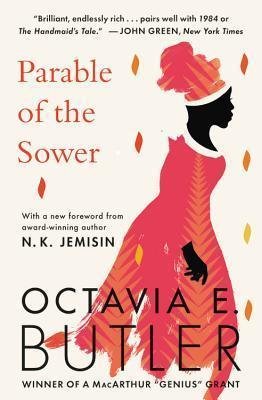
Even though the science fiction/fantasy genre is my favorite genre, I have never read a novel by Octavia E. Butler. I felt like I couldn’t call myself a true lover of the genre until I had done so. When broached to remedy that situation with a new release of Parable of the Sower by Grand Central Publishing, I jumped at the chance.
I am glad I read it, but I cannot say I loved it. Had there been no religious tones to it, no Earthseed, I suspect I would feel differently, for it is Lauren’s spiritual goals that set me on edge. I respect her belief system. The idea of God as Change is a compelling one, one that I keep mulling over in my head even though I long ago gave up believing any diety. It is her idea that there is literal heaven waiting for her believers, that her believers will populate the stars, where I dig in my heels. Sure, I doubt there is a soul on this planet who has not looked to the stars and envisioned living there someday, who does not believe that the future of our species requires space exploration and finding an inhabitable planet in a far-reaching galaxy. Yet to believe that your followers alone are to inherit that planet is both grandiose and egotistical, something Lauren is not. So yes, I found Earthseed to be a bit ludicrous and distracting.
I loved the dystopian aspect of the novel, however, and wish the entire story focused on that. The matter-of-fact manner in which Ms. Butler describes the rampant poverty, the crime, the desperation is chilling. Even more so is the idea that Lauren’s father is a few year’s older than my husband and that this entire novel occurs seven years from now. It takes no great stretch of anyone’s imagination to bridge those years and envision how such a fall in society can come to pass. Since Ms. Butler wrote this novel in the early 1990s, one could argue that the signs for what we are now experiencing have been around for decades if only we were looking for them and acknowledging them.
It is difficult to read any dystopian novel these days and not compare it to ones previously read. The trick with Parable of the Sower is to remember that it was among the first of its kind. While such emotionless talk of rape might not phase anyone today, back in 1993, it would have been a shock to the system. That a woman could write of such things and do so with no sense of fear or blame but as a genuine symptom of the fall of society would have been unfathomable, and therein lies Ms. Butler’s mastery. She created something no one could imagine, utterly different from the worlds of Orwell and Conrad, of Clarke and Asimov. She did so with nothing more than reading the news from around the world, honing in on specific stories, and letting her imagination answer the question, “What if?”.
I did not necessarily enjoy Parable of the Sower because too much of it is Lauren’s Earthseed, but I am glad I read it and got to experience this essential science fiction writer finally. I want to read more of her novels to find out what other worlds she shared with us. I know better than to read stories with religious overtones, so next time I’ll just stick with aliens.
